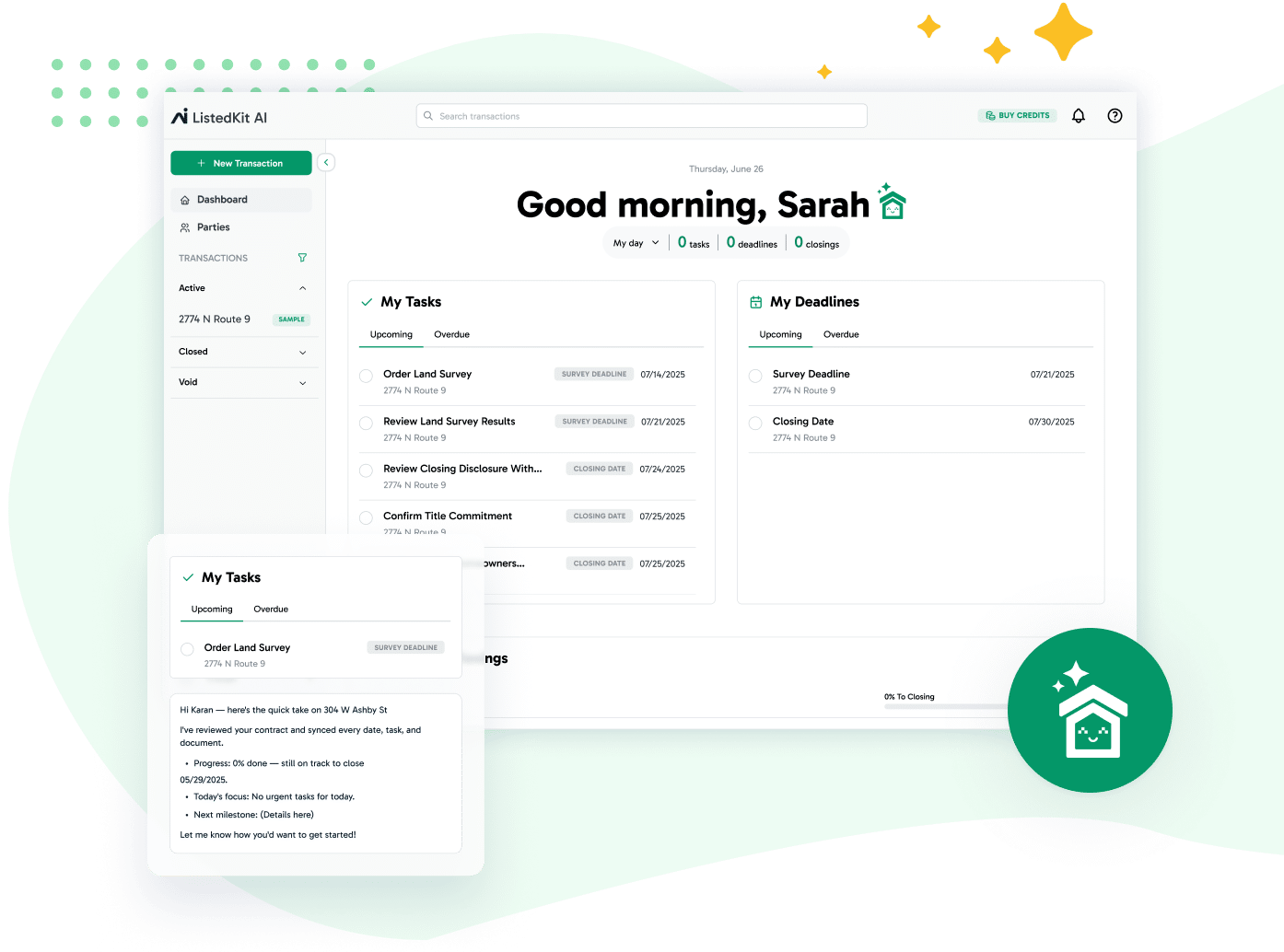Coordinating real estate transactions across multiple states introduces a distinct set of challenges. From varying state regulations to differing timelines and documentation requirements, transaction coordinators (TCs) must become knowledgeable and comfortable with the different state laws.
In this guide, we’ll break down the key challenges of managing multi-state transactions and provide actionable strategies to help you stay organized, meet deadlines, and ensure compliance—no matter how many markets you serve.
Legal Requirements and Their Impact on Coordinating Transactions
Real estate businesses have to consider the management of multi-state property transactions based on the variation in legal requirements when crossing state boundaries. Real estate law, disclosure forms, and closing procedures are inarguably varied from state to state. A few examples include:
- Disclosure Forms: The state of California law requires very extensive natural hazard disclosures. While in Texas, buyers are required to have specific information regarding their flood zone.
- Closing Procedures: Some states require attorneys to attend closings. While in other states, such as Arizona, closings can be conducted by title companies.
- Transfer Taxes: New York charges transfer taxes related to the sale price of a house. Other states charge nominal fees or none at all.
These are just some of the differences that a transaction coordinator faces. To effectively facilitate the transaction from beginning to end, TCs must know state-specific documentation, legal issues, and timelines for each transaction that comes across their desk.
Practical Tips for TCs Handling Multi-State Transactions
- Learn about state-specific requirements. Use a state real estate commission or association to reference the current real estate legislation and regulations within a particular state.
- Employ cloud-based real estate software solutions: Choose one that provides the hosting center with state-specific forms and legal updates to help streamline the research and document creation process.
- Consult with a state expert: Connect with coaches who are experienced in specific state regulations to be up-to-date and transact with confidence. Also build relationships with a network of title companies, attorneys, and Realtors across each state for further advice.
Managing Multiple Deadlines: Staying on Top of Timelines Across States
Real estate transactions are already time-sensitive, where you have deadlines for inspections, appraisals, loan approvals, and closings.
Coordinating meetings across different states adds another layer of complexity. Each state in which the agent above has licensure may have a different expectation for any given timeline. Missing just one key deadline can put the entire transaction process in jeopardy.
Whereas the usual Florida real estate contract inspection period is 15 calendar days, buyers utilize that time to conduct due diligence on the property and request repairs. On the other hand, New York’s attorney review period is usually three to five business days.
Negotiations during this time may take considerably longer. For example; the state of Florida takes less time in its inspection periods and is usually quite forthright with them. While in New York, inspections are more likely to be delayed on account of extended legal discussions.
In essence, any transaction coordinator handling both states has to be on their toes regarding the schedules unique to each of the states involved in the transaction.
Here are some helpful ways to track deadlines:
- Make an inventory of detailed tasks related to the particular transaction. Break down the tasks into smaller bits, focusing on each state individually.
- Use transaction management software with reminders. Platforms like ListedKit allow TCs to establish automatic, customized reminders so that nothing falls between the cracks.
- Standardize all communications among all parties involved. Keep lines open with clients, agents, escrow agents, and other service providers regarding the timeline of the transaction.
ListedKit’s automated timeline features make it seamless for TCs to manage multiple deadlines and keep everyone on the same page. Automatic reminders and key date tracking make it easier to avoid costly delays and maintain better organization.
Compliance Documentation: What Every TC Needs to Know
Compliance documentation can vary quite a bit from state to state. Some states require detailed transfer tax documents, while others require specific mortgage-related forms. Even common documents, such as purchase agreements, may vary in structure and the type of information required.
Non-compliance may lead to critical problems, which include legal fighting or hefty fines. Therefore, it is of prime importance that the transaction coordinators remain informed about required documentation for a particular transaction.
A few of the commonly occurring compliance errors are:
- Transfer tax errors: Failure to submit appropriate transfer tax forms in states such as New York or Pennsylvania, where these taxes are required.
- Missing or improper forms: Forgetting to attach the state-specific mortgage disclosure forms may lead to loan approval delays.
To avoid such pitfalls, a better course of action could be to use customized templates that can be modified according to every state-specific requirement. Learn more about ListedKit templates here.
Artificial Intelligence in Multi-State Document Management
The AI model used in ListedKit’s contract processing feature extracts case information and organizes it for easy access, allowing TCs to reduce data entry time. The system uncovers important information like deadlines, information of the parties involved, terms of title insurance, or transfer taxes that differ per state and document.
How AI enhances multi-state transactions
- Reduces errors: AI flags missing or incorrect information in the contracts to minimize the chances of compliance errors.
- Saves time: TCs needn’t go through each and every contract for state-specific clauses but can focus on more strategic tasks.
- Smoothens document intake: The AI-powered platform extracts case information and organizes it for easy access, allowing TCs to reduce data entry time.
Thus, AI-driven document management solutions help multi-state TCs handle multiple transactions across states. It does so by increasing their accuracy and, therefore, making the outcomes successful.
Efficient Task Management for Multi-State Coordination
Managing multi-state transactions requires tracking numerous tasks, making it a time-consuming process. From reviewing contracts to preparing for closings, TCs must complete many steps, often in different sequences based on state regulations. To manage these requirements, TCs need task management systems. One that is both flexible enough to handle state-specific nuances and structured enough to ensure nothing is missed.
ListedKit delivers a customizable workflow solution through its task kits feature, empowering TCs to create and optimize workflows that automatically adjust to the unique needs of each state. Every step of the transaction process—whether it involves document storage or stakeholder communication—can be seamlessly integrated into these workflows.
Tips for Efficient Task Management
- Make state-specific lists of tasks: Ensure every transaction has a list of tasks, specific to the state the transaction is taking place in for preparation from contract to final closing.
- Prioritize by deadline: Determine what needs to be done first, using urgency and importance. Transaction management systems like ListedKit can facilitate this with automated due dates and prioritization.
- Automate repetitive tasks: Utilize the features of the software to automate repetitive tasks, such as using email templates to send messages to clients and stakeholders and filing documents.
Best Practices for TCs Handling Multi-State Transactions
Handling multi-state transactions is challenging. Here are a few best practices to stay organized and compliant:
- Stay informed about state laws: Regularly visit real estate commissions and legal resources to keep up with changing regulations.
- Systemize your process: Use workflows that are both flexible and reliable to guide each transaction.
- Maintain transparent communication: Keep open lines of communication with clients, agents, and stakeholders to reduce miscommunication and ensure everyone stays aligned.
By taking a more structured approach—and using tools like ListedKit to streamline workflows—TCs can effectively navigate the complexities of multi-state transactions.
Simplifying Multi-State Coordination with the Right Tools
Managing real estate transactions across multiple states is fraught with challenges related to legal issues, documentation, and deadlines. By using technology solutions like ListedKit, transaction coordinators can handle these challenges more easily while staying compliant with state-specific requirements for successful closings.
ListedKit simplifies multi-state real estate coordination with customized workflows, AI-driven document management, and automatic reminders. Adopting these tools helps TCs improve performance, maintain compliance, and stay competitive in a fast-paced real estate market.




